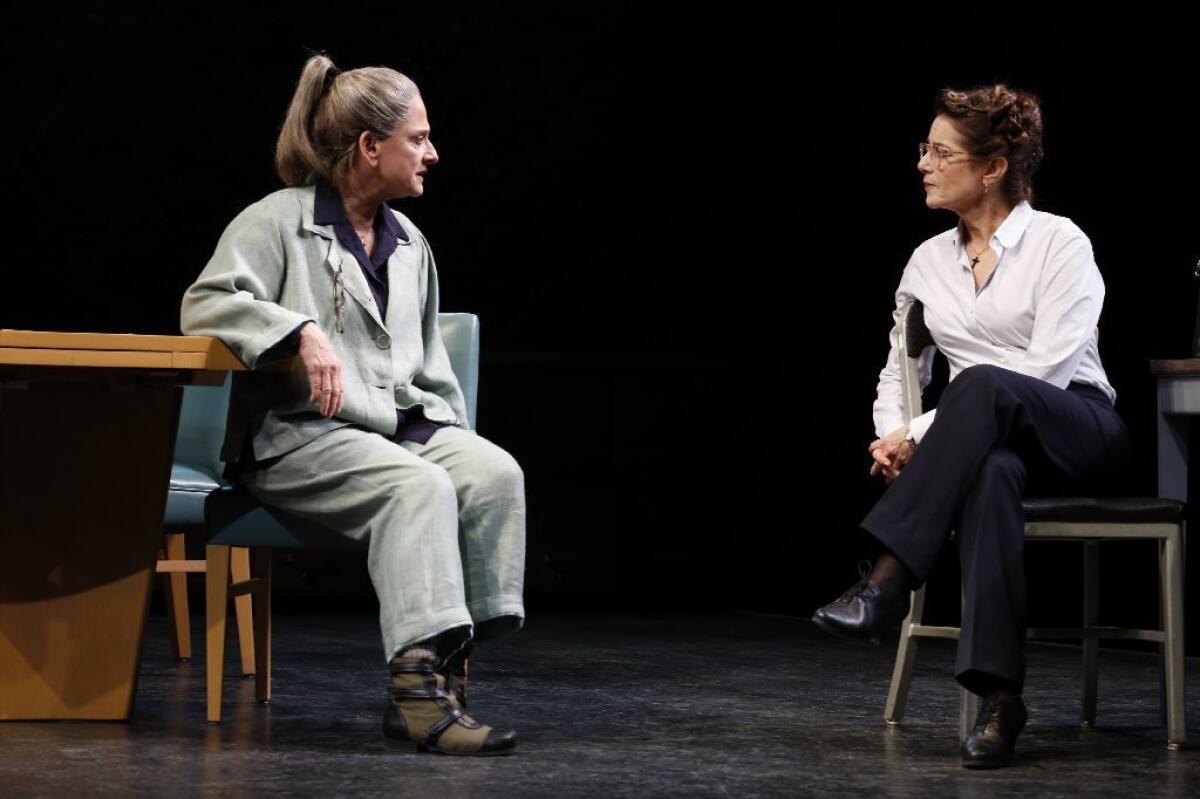David Mamet’s ‘The Anarchist’: What did the critics think?

With two productions running on Broadway this fall, David Mamet is once again the talk of New York theater. And talk is the operative word for his new play, “The Anarchist,” starring Patti LuPone and Debra Winger. This 75-minute, two-character drama is by all reports a dense, loquacious conversation that could prove challenging for most audiences.
“The Anarchist,” which opened Sunday at the John Golden Theatre, consists entirely of an extended dialogue between a longtime incarcerated leftist radical (LuPone) and the prison official (Winger) who will determine her fate.
Mamet has directed his own play, as he did with his previous drama “Race,” in 2009. This week also will see a new revival of Mamet’s “Glengarry Glen Ross,” starring Al Pacino, opening Saturday at the Gerald Schoenfeld Theatre.
LuPone has worked with the playwright on numerous occasions, including the plays “The Old Neighborhood” and “The Woods” as well as the movies “Heist” and “State and Main.” Winger makes her Broadway debut in the play, but she is no stage neophyte. She appeared in a production of Chekhov’s “Ivanov” at American Repertory Theatre in 1999.
How did critics react to Mamet’s “The Anarchist”? Most remarked on the absence of Mamet’s typical profanity in the new play, as well as the strong undercurrent of lesbianism that was also present in Mamet’s last all-female drama, “Boston Marriage.”
Ben Brantley of the New York Times called “The Anarchist” a verbally dense and intellectually challenging piece. “Ms. LuPone, a Mamet veteran, navigates these clotted waters like the freestyle champion she is. Ms. Winger, in her Broadway debut, mostly dog paddles.” LuPone’s performance reminds us that “this Tony-winning star of musicals is a terrific dramatic actress.”
The Hollywood Reporter’s David Rooney described the play as an “aridly intellectual two-hander” that is “desiccated, dull and virtually without drama.” LuPone is a “natural” when it comes to Mamet dialogue, while Winger is still “finding her way.” The play is “a poor fit for Broadway and a $130 top ticket.”
Chris Jones of the Chicago Tribune wrote that LuPone is a “consummate interpreter” of Mamet’s works. “She understands how to foreground his language without giving up the rest of what an actor does.” But the play could be seen as “as a cautionary tale for the writer who gains so much clout that he can now get anything up in the great American marketplace... without any of the usual checks and balances.”
The Associated Press’ Mark Kennedy wrote that the production “seems more like a fragment of a play, or an acting exercise or a film short.” The dialogue is “very smart, just not very interesting.” Mamet ultimately undermines himself with “a creepy fascination with lesbianism and a play that seems to hate pausing even for a second.”
RELATED:
David Mamet to lend his voice to ‘The Simpsons’
Theater review: David Mamet’s ‘Race’ on Broadway
More to Read
The biggest entertainment stories
Get our big stories about Hollywood, film, television, music, arts, culture and more right in your inbox as soon as they publish.
You may occasionally receive promotional content from the Los Angeles Times.











